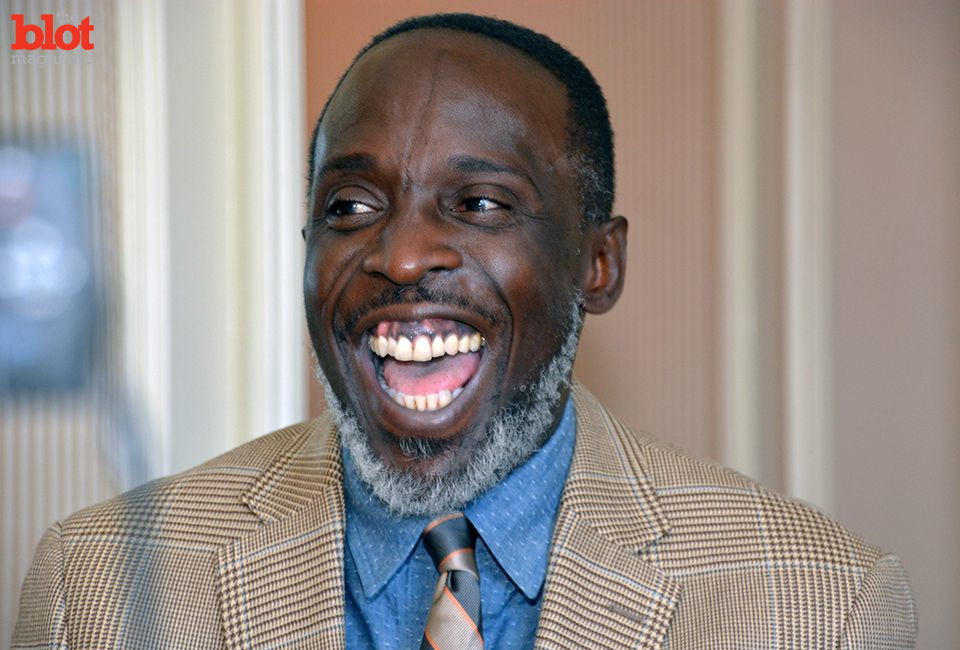He’s a new face for the Gap’s 2014 fall campaign and was recently named the ACLU Ambassador for Ending Mass Incarceration, but most know Michael K. Williams as Omar Little on “The Wire.” President Obama said Omar was his favorite character on what he called “one of the best shows of all time,” and Omar earned Williams a 2009 nomination for an NAACP Image Award for Outstanding Supporting Actor in a Drama Series.
In a quote from the Johns Hopkins News-Letter, Williams said, “When the character of Omar died, I buried a lot of darkness with him, darkness that I hope is buried for good.” As a young teen, Williams got addicted to drugs and alcohol, and in a barroom brawl on his 25th birthday, his face was slashed with a razor, which left him with the signature scar across his face.
Currently, Williams stars as Albert “Chalky” White on “Boardwalk Empire;” its fifth and final season began airing on Sept. 7. Williams’ wildly successful TV career includes stints on “CSI: Crime Scene Investigation,” “Boston Legal,” “The Sopranos,” “Law & Order: SVU” and “Third Watch.” He’s also wracked up many movie credits including “12 Years a Slave,” “RoboCop” and “Kill the Messenger.”
Who knows how he found the time to also form a movie company called Freedome Productions, but what impresses me most is his gratitude and humility after rising high above his hardscrabble background. This guy has good karma, too — through his commitment to give back and help underprivileged youths.
I see Williams’ face daily now when I walk my dog to the corner of West 23rd Street and 8th Avenue. In the Gap window, Williams’ face looms overhead in a larger-than-life-sized poster. It was a thrill to sit down and talk with the celebrated actor in person for TheBlot Magazine.
Dorri Olds: How did you learn to convey emotion without speaking?
Michael K. Williams: First of all, thank you. I take that as a compliment. I pay very close attention to that. You know, it’s all about empathy and compassion. You can see things in just a look in someone’s face. You can say a thousand words without saying anything. The characters I play can be looked at as just menacing and too one-noted. I like to bring compassion and humanity to these characters and give them diversity. The way I do that is by showing different ranges of emotion. I could tell you I’m hurt right now without saying a word. We all want to feel good, but have all been hurt. We act out different ways from our pain, and I try to put that into the character to humanize them.
Is that how you make bad guys so endearing?
I feel that I’ve been given this blessing to be an actor to be a voice for my community, for young men that I grew up with, that I know are coming up and society will look at as just a menace. I’m not saying they made good choices in life, but let’s realize they are still a human being. They’re still someone’s child, someone’s parent; someone loved them and still wants the best for them. They want good for themselves. Not excusing their decisions, but everybody wants to be good.
I feel grateful that people see I play my characters with empathy and compassion and a little understanding about why that person got to where they are. Not excusing it, but it is what it is. I think when President Obama made public that he thought my character Omar was his favorite, he got some flack for that. He had to quickly go, “No, I am not condoning his actions. I am just saying I respect this character. I understand this man and where he came from and the journey of how he got to where he is, and that’s just it but I don’t condone his lifestyle.”
Would you like to see “The Wire” made into a movie?
Absolutely. I believe that David Simon said if there were to be a movie of “The Wire” it would have to be a prequel. I think it’s important to show the process of how people got to where they are. You know, nobody wakes up in the morning and says, “I got it! I’m going to be a drug dealer” or “I’m going to rob people for a living.” Everybody wants to be proud of what they do and feel good about life and feel good about themselves. People are put into positions where they have to make decisions that are not healthy, for whatever reasons, and it’s important that we show that process. That’s where I attack my characters from. I show the process.
Growing up in East Flatbush, Brooklyn, I bear witness to that. I saw the chain of events that led up to someone making bad decisions. What made “Boardwalk Empire” so special to me was we all know of Lucky Luciano and Al Capone. We know them to be these infamous gangsters, but we’ve never seen them the way we got to see them on “Boardwalk Empire,” where we got to see a 19-year-old Al Capone and how that rise to infamous-y came about it.
Did you form your new company Freedome Productions to act as a director on films?
No. I do not want to direct. I want to save the little bit of hair I have. [Laughs] However, I do want to produce. There are five projects in work right now. I’m in the process of developing scripts and soliciting writers. My main goal for Freedome is that it be my next journey where I have more power behind the camera. The reason I want the power is to create opportunities for people I deem talented. I don’t want to be a manager or an agent. I just want the ability to say, “You know what, I like you. I want to hone your talent. Let’s build something around you.” I’ve been doing that already. That’s how Felicia Pearson got to “The Wire” to play Snoop and Eddie Morales, I gave him his first job, too. He’s now stage director for Mariah Carey, Janet Jackson and Justin Timberlake. I get good vibes from creating opportunities for people.
Can you tell me about your charity Making Kids Win?
Professor Ogletree from Harvard — we call him Tree — was the first in the country to start “The Wire” classes. He got “The Wire” cast members to come speak to his class. We did symposiums, and now I can call Tree my friend and Skip Gates my friend. Tree was always pulling me aside and asking me, “Mike, what is happening with your nonprofit?” Sonja Sohn already had Rewired for Change. Jamie Hector already had Moving Mountains. Tree kept cornering me saying, “Michael, I want you to start a nonprofit.” I kept dancing around it until one day he got these three young ladies, his students. They were all seniors at Harvard, and they cornered me and said, “What’s the problem? Tree told us to sit down and talk to you. What is preventing you from starting a nonprofit?”
I was moved to tears and said, “I’m scared. I don’t know enough. I don’t know that world. I didn’t go to school.” They said, “Mike, you don’t understand. The only thing you need is what you have in spades.” And I’m like, “What’s that?” They said, “Passion! You just gather a team around you, and we’ll handle anything you don’t understand.” When they told me that, I ran with it, and they kept true to their word. These three ladies surrounded me, and they pulled the team together. The paperwork was processed, and now Making Kids Win is registered.
Watch an excerpt from this interview:
Dorri Olds is a contributing journalist for TheBlot Magazine.







